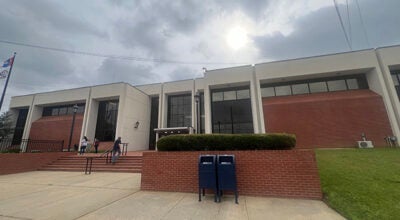District road crew veterans respond to storms
Published 9:18 am Wednesday, May 29, 2024

- From left, Shane Carlisle, Ricky Nations, Jimbo Hall, John David Hart, Terry Fuller, Johnny Hodges, Garrett Blackmon and Colten Etheridge work to serve District 3 in Lincoln County. (Hunter Cloud | The Daily Leader)
Editors note: this is the first in a series of stories on Lincoln County’s District 3 road crew.
ENTERPRISE — In the wee morning hours of May 13, Jimbo Hall woke to trees down on his property including his personal truck. A damaging storm rolled through District 3 and later produced two EF1 tornadoes in Lawrence County.
It was a rough storm. Hall is a member of Lincoln County’s District 3 Road Crew. He said went to work right away with his daughter, cutting up trees and cleaning out debris in an effort to get roads cleared.
“I didn’t worry about the truck. I had a job to do,” Hall said. “We got down the road and people were cutting up trees. I got out my tractor and pushed the tree out of the road. We had to get the road open.”
Hall has worked in Lincoln County for 25 years on the road crew, spending some time in District 4 before moving over to District 3 with former supervisor Nolan Williamson. He does whatever is needed no matter what. His jobs change from brush hogging to running the trackhoe and working on the roads.
Storm damage cleanup happens to be one of the responsibilities for district road crews. Hall left his home to help his community. It wasn’t the first time and likely will not be the last time he does so.
“I can replace the truck but as long as my family didn’t get hurt I’m fine,” Hall said. “Katrina was rough. It took months to clean up, it wasn’t just days.”
Hall added he has stuck with the job because his coworkers and District 3 Supervisor John David Hart tell him he does a good job. He enjoys his work as well.
“All the hands, we get along,” Hall said. “That is what I like about it. No hollering or fussing. We all get along. That’s the way it should be at a job.”
Working through Katrina
Ricky Nations is the senior employee in District 3. He has worked on the road crew for 35 years, 28 of them consecutively. A brief hiatus in his younger days was due to driving trucks. His career in Lincoln County started when he was 18, building fences, patching holes and doing labor work.
Opportunities eventually presented themselves. Nations said he started driving equipment and took every opportunity he could to learn. Even if the time was spent moving equipment from point A to B, he familiarized himself with the controls and how to operate it.
Nations is able to run the motor grader and helps run the chip spreader in the county. Crews get together to pave. It is a fun time, he said. The districts are planning to do it again.
“Every chance I had to learn something new I jumped at the chance. I’ve learned how to operate a lot of things. I enjoy working for the county,” Nations said. “It is a challenge but it is also rewarding.”
Storm cleanup can be a challenge but rewarding at the same time. Nations explained they have to take precautions during storm cleanup with downed power lines. Safety comes first.
“It can be nerve wracking at times. You are out there in the dark and it’s a challenge to see lines in the trees,” Nations said. “You have to investigate them to make sure there are no power lines in it.”
If road crews come across downed power lines they have to wait on the power company to give them the all clear. Most of the bad weather comes at night when it is pitch dark, Nations said.
May 13th’s storms had crews out working to clear roads at 3 a.m. Nations estimated a 100 trees or more were down in the aftermath. District Two’s road crews came and helped as did District 4.
“I’m not fond of the storms. I love our work on the roads and improving the roads,” Nations said. “I don’t anticipate the storms anymore. There have been many, many saw hours.”
Hurricane Katrina was described by Nations and others as the worst storm to ever hit Lincoln County in recent history. Nations said they cleared debris for at least two months after Katrina. By comparison, Hurricane Ida kept them busy for a few days.
“It was the worst one we have been through. We’ve had tornadoes and strong winds but those are in small areas. This was our whole district,” Nations said. “When Katrina hit we were here at the shop that morning and tried to get out moving trees. It got so bad we had to come back. The wind started to let up a bit so we started moving again. Even though we would push trees out of the roadway, another one would fall behind us.”
It was hard to get gas during the storm and subsequent aftermath. A welder hooked up tanks for the district crew to get gas. The tanks are still there.
Katrina was a challenge to work through, Nations said. He can still recall the work they did in it.
“We were trying to get water to people and getting people out. We worked through one section to get a lady in labor out,” Nations said. “Ida came through and we had a lot of damage but it was nothing like Katrina. It was a few days of work. It didn’t take out power like Katrina did. We had power out then for 15 days. Katrina was the worst we have faced here in my lifetime. Camielle came through in 69 and I was four. Katrina was the first one I faced working for the public. It was a challenge but we managed to make it through it.”





